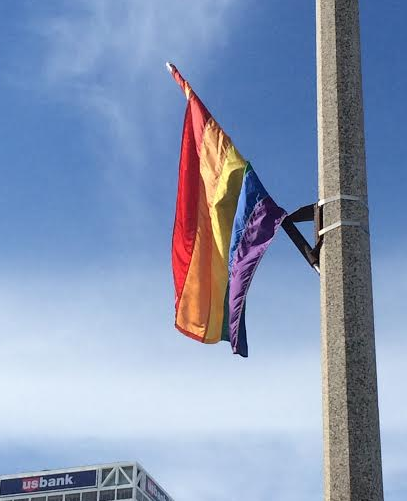The Ritual of Coming Out

Picture this: you’ve gathered your parents or your friends in the living room, waiting to hear what you have to tell them, and you’re filled with anxiety. Will they accept you and say you love them? Will they reject you horribly and cast you out? This is the kind of pressure LGBT youth faces constantly. According to the Human Rights Campaign, 42% of LGBT youth say they live in a community that doesn’t accept LGBT people, both youth and adult.
Whether you are gay, lesbian, asexual, trans*, or any other identity under the LGBT umbrella, there may have been a time that, even for a split second, you were scared of rejection. Especially with statistics showing that familial rejection of LGBT youth can lead to poor health and irrational decisions. According to the Family Acceptance Project, LGBT young adults who’ve reported rejection by their family are 8.4 times more likely to attempt suicide, 5.9 times more likely to report severe depression, and 3.4 times more likely to use and abuse illegal drugs. Scary statistics, right?
“Well, I figured out I was a lesbian on March 17th, 2015. I was scrolling through the LGBT tag on Tumblr and it hit me like a ton of bricks that I wasn’t as straight as I always thought,” says Ellen Wieland, a junior at Arrowhead. “From there, it’s just been an interesting journey figuring out who I am and how I want to live my life.”
Many LGBT youth have also reported low self-esteem about themselves, not only for the way they look, but for their identity itself.
“When I came out to my boyfriend as genderfluid, I was really scared. I was really confused and didn’t know if maybe it was just a phase. He met me with approval and I felt accepted. I told a few other people, but I still felt self-conscious. You couldn’t tell just by looking at me, after all,” another anonymous student at Arrowhead says. Genderfluid means that the person’s gender varies from time to time, sometimes feeling more of one gender than another. “It went well for maybe, four months, before everything went haywire. My boyfriend left me, and being genderfluid was partially the reason why. My best friend would tell me how my identity was invalid. He’d keep drilling it into my mind. I hate myself for being the way I am. I just wish I could’ve just kept it all a secret.”
Despite being a loving community, LGBT youth still faces bullying and pressure from their peers and families. How can we, as a community, create a more loving, accepting community and bring those statistics down, even just a little bit?
Often, hetero and cisnormative society scorns the LGBT community, especially its youth, claiming that they are going through a phase and it won’t last. “I can’t stand the idea of being genderfluid. I feel like this is the thing adults would say ‘You’re just going through a phase!’ to,” the anonymous student says. “But I wouldn’t lie to myself. I can fake how I feel, but at the end of the day, I’m still genderfluid and I still hate myself.”
Other effects include self-harm, drug and alcohol abuse, dangerously low self esteem, suicidal thoughts and actions, and other harmful psychological effects. Another negative effect of a heteronormative society is the fetishizing of same-sex couples.
“When I date females, I often find my relationship to be fetishized by boys talking about ‘how hot two girls making out’ is,” says Holly Craven, a pansexual junior at Arrowhead. “I took my girlfriend to homecoming freshman year, and throughout the night I was pointed to and laughed at as we danced. I also face the struggle of being told that I’ve ‘turned straight’ when I date a guy or ‘turned gay’ when I date a girl.”
“I came out to my father, and later my mother, as a lesbian after my eighth grade year. I felt like if I didn’t ‘pick a side,’ I would be labeled as a slut or greedy or confused. Due to the bi and pan-phobia from both straight society and the LGBT community, I felt like I had to confine myself to the term lesbian,” says Craven.
Some LGBT youth have confidence in themselves, despite not receiving approval from their family members. “I never feel ashamed of who I am,” says Wieland. “I think being straight would make my life easier, but never in a million years would I choose to be anyone but myself. I love who I am, and I love being a part of the amazing group of people that make up the LGBT+ community.”
Hannah • Aug 19, 2016 at 11:12 PM
I think this was beautifully written. Everything in here is so accurate and I love reading the truth for once. People who were questioned for this article are so brave to have opened up about their sexuality at such a young age.